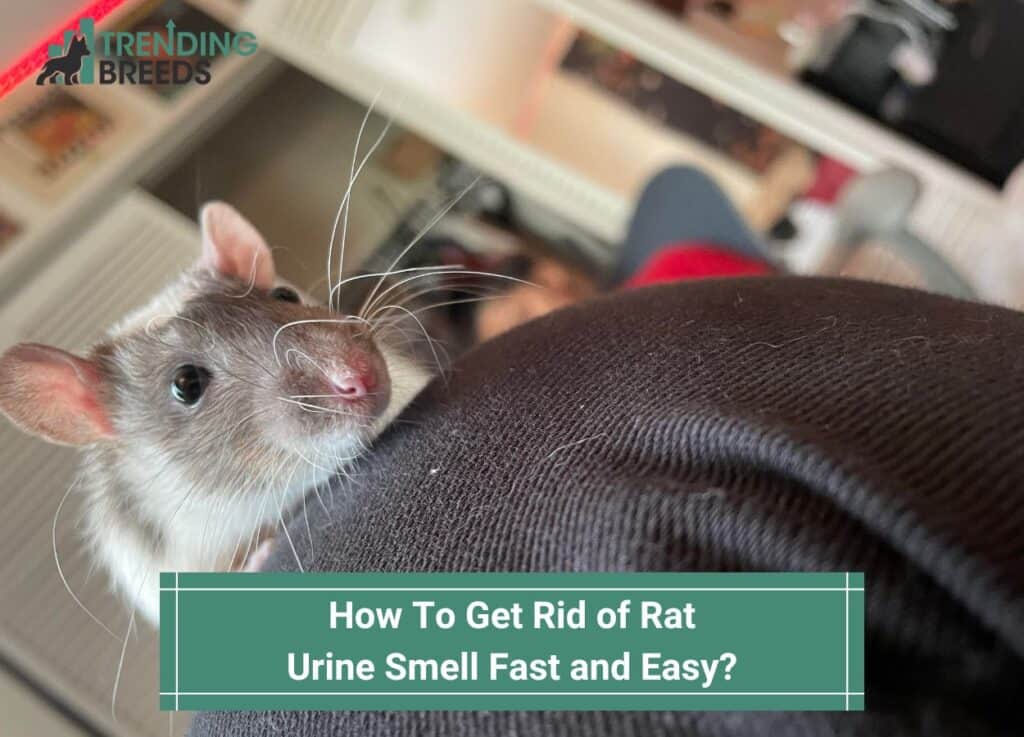
If there are rats in your home, the odor of their urine can be overpowering and persist for an extended period, posing a challenging task to eliminate. So, how to get rid of the rat urine smell?
While there are numerous methods to remove rat urine, it is essential to remember that an enzyme cleaner is required.
The rationale is that enzymes can disintegrate proteins into smaller particles, allowing for rapid degradation.
Once these proteins break down, the odor will diminish, and the smell will not linger for an extended period.
Read on to learn more.
Before you scroll further down this guide, check out these other rat-related articles: How Long Can a Rat Live Without Food? and How To Tell If Your Rat Is Too Skinny?.
Table of Contents
What Does The Urine Smell Like?
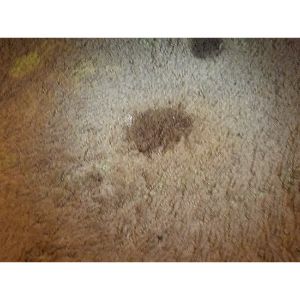
If you detect a strong and unpleasant smell in your home, it could be due to rat urine. First, however, it’s crucial to confirm that it’s indeed rat urine and not something else causing the odor.
Wasting time cleaning up the wrong thing won’t solve the problem, and you also want to avoid having rats in your house.
Rat urine has a distinctive and overpowering odor that distinguishes it from other animal urine.
That is because rats have a diverse diet that includes meat and plants, resulting in a more complex chemical composition in their urine and feces.
In contrast, cat and dog waste mostly come from animal protein, resulting in less complicated waste.
Rats also lack hygiene habits and may urinate and defecate anywhere. It produces more compounds like urea and ammonia in their urine, contributing to its pungent odor.
Duration Of Rat’s Urine Smell
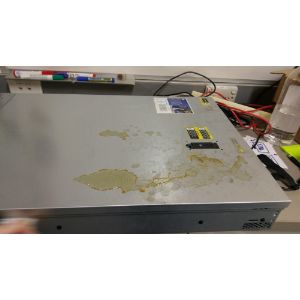
Rat urine, comprised of protein, uric acid, and urea, emits one of the most potent odors known to humans. In addition, uric acid content facilitates the formation of ammonia when the urine dries, intensifying the stench.
The duration of the odor’s persistence depends on the humidity levels and the elapsed time since the rat urinated on a surface, ranging from several days to weeks.
The longer it remains unattended, the more intense the smell becomes. Therefore, cleaning up any rat urine is crucial, as it can lure in additional rats or pose a health hazard if they come into contact with old droppings.
The colony’s size is also crucial – the more rats in one location, the stronger the odor emanating from their urine, as they have more of it to discharge.
It suggests that if only a few rats are in your home, their urine’s effect will likely be short-lived.
How To Clean Rat Urine?

Cleaning up rat urine and feces is inevitable when dealing with rats. Rat urine is intensely pungent, while the manure can be adhesive and challenging to remove from surfaces.
To clean up the mess effectively, prepare a solution of one-part bleach to ten parts water. The bleach solution will help eliminate any remaining bacteria in the urine or feces.
Wear rubber gloves to protect your hands from the bleach solution, then use paper or cloth towels to absorb as much urine as possible. Ensure that you clear all of it to avoid drying on carpets or furniture, which can lead to stubborn stains that are difficult to remove later on, even after weeks.
Next, thoroughly wash all surfaces that came in contact with the rats using the bleach and water mixture. It includes walls, floors, doors, windowsills, etc.
Ensure that you clean off every area thoroughly! If there is still a persistent stain after using the bleach solution, try hydrogen peroxide instead. It is milder than bleach but equally effective at eliminating bacteria similarly, although it may not be suitable for killing all types of bacteria.
Can Rat Urine Make You Sick?
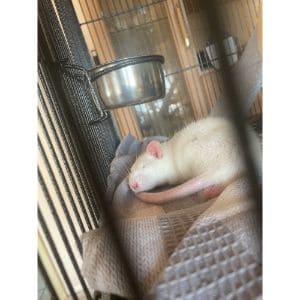
Although the risk is relatively low, coming into contact with rat urine can cause infections in wounds and cuts.
In addition, rats are a significant health concern for people with suppressed immune systems because they can carry diseases like leptospirosis, hantavirus, and bubonic plague.
It’s best to stay away from areas where rats might be present if you have an open wound or cut to avoid getting sick from rat urine.
In addition, if you become ill soon after being exposed to rat urine, it may indicate an associated infection.
Rats are known for carrying and spreading diseases such as Salmonella, Leptospirosis, Lymphocytic choriomeningitis virus (LCM), Hantavirus, Rat bite fever, Rat-bite fever virus (RBDV), and even the plague.
In addition, people can become ill from handling or touching rat droppings or urine, inhaling dust contaminated with rat urine or droppings, or eating food contaminated with rat feces or urine.
Therefore, proper hand washing is crucial to prevent food contamination.
The effects of these diseases on humans can vary from mild illness to severe illness and even death, depending on the type of disease contracted from exposure to rats.
FAQs About Rat Urine
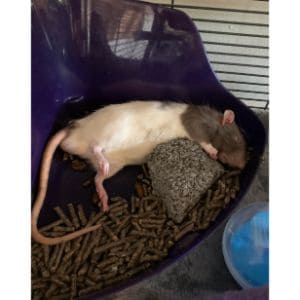
Does rat urine smell go away?
The smell of rat urine can be challenging to eliminate, but it is possible with proper cleaning and sanitation measures.
Rat urine contains organic compounds such as urea and ammonia, which can cause a persistent and unpleasant odor.
It’s important to note that if rat urine has seeped into porous materials like carpets, fabrics, or wood, it may be difficult to remove the odor altogether. In such cases, it is best to get professional cleaning services to eliminate the smell.
How long does a rat smell last?
The duration of the rat smell depends on several factors, such as the amount of urine or feces present, the ventilation in the affected area, and the cleanliness of the environment.
Rat urine has a strong and persistent odor that can last several weeks or even months if left untreated. However, proper cleaning and disinfection can significantly reduce or eliminate the smell within a few days or weeks.
The smell may persist for extended periods if the rat urine has seeped into porous materials like carpets, fabrics, or wood. It may require professional cleaning services to remove it altogether.
Maintaining proper hygiene and promptly addressing rodent infestations can prevent the odor from recurring.
Does vinegar neutralize rat urine?
Vinegar is an effective natural cleaner to help neutralize and eliminate rat urine odor.
However, vinegar is acidic and can break down the organic compounds found in rat urine, such as urea and ammonia, contributing to the unpleasant smell.
To use vinegar to clean rat urine:
- Mix equal water and white vinegar in a spray bottle and spray the affected area.
- Allow the solution to sit for a few minutes before wiping it clean with a cloth or paper towel.
- Repeat the process as necessary until the odor goes away.
While vinegar can be effective in neutralizing the odor of rat urine, it may not be as effective in removing the stains left behind by the urine.
In such cases, a more robust cleaning solution may be necessary to remove the stain altogether.
Additionally, it’s important to note that vinegar can damage certain surfaces, so it’s essential to test it on a small, inconspicuous area before using it on a larger size.
What is the best cleaner for rat urine?
The best cleaner for rat urine can break down the organic compounds in the urine, disinfect the affected area, and eliminate the odor. Here are some options for effective cleaners for rat urine:
Enzymatic cleaners
These cleaners contain enzymes that break down the organic compounds in the urine, effectively eliminating the odor.
Bleach
A bleach solution can effectively kill bacteria and disinfect the area. Mix one part bleach to ten parts water, apply to the affected area, and let it sit for at least 10-15 minutes before rinsing with water.
Hydrogen peroxide
Hydrogen peroxide is another effective disinfectant that can break down the organic compounds in rat urine.
Mix equal parts of hydrogen peroxide and water, apply to the affected area, and let it sit for at least 10-15 minutes before wiping it clean.
Commercial disinfectants
Several commercial disinfectants are available, specifically formulated to eliminate the odor and stains from rat urine.
Using gloves and protective gear when handling rat urine and cleaning products is essential to avoid health risks. Additionally, proper ventilation is necessary when using robust cleaning solutions.
Is breathing rat urine harmful?
Breathing rat urine can be harmful as it can contain harmful bacteria and viruses that can cause serious health issues. Rat urine can also contain organic compounds such as ammonia, which can be dangerous if inhaled in large amounts.
Rats carry several diseases, including hantavirus, leptospirosis, and salmonellosis. These diseases can transmit to humans through contact with rat urine, droppings, or breathing in dust contaminated with rat urine.
Inhaling rat urine over a prolonged period can cause respiratory problems, such as asthma and other lung-related diseases. It can also lead to allergies, headaches, and flu-like symptoms.
If you suspect you’ve been exposed to rat urine, seeking medical attention is essential.
Additionally, it’s crucial to take preventive measures to avoid exposure, such as wearing protective gloves and masks when cleaning up rat urine and maintaining proper hygiene and sanitation in your home or workplace.
So How Can You Get Rid of Rat Urine Smell Fast and Easy”
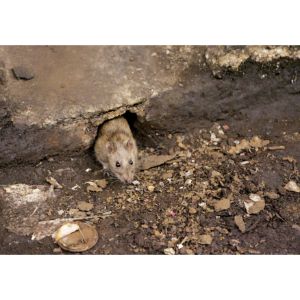
The presence of rats in a home can lead to overpowering odors from their urine, which can persist for a long time.
Therefore, cleaning rat urine should be done promptly to prevent the spread of diseases and avoid persistent smells.
In addition, rat urine can carry and spread diseases such as Salmonella, Leptospirosis, Lymphocytic choriomeningitis virus (LCM), Hantavirus, etc.
Therefore, proper cleaning, sanitation, and hygiene measures are essential to prevent the spreading of diseases associated with rat urine.
If you find this guide, “How To Get Rid of Rat Urine Smell Fast and Easy,” informative and helpful, you can check out these other rat-related articles from our team:
You can learn more about this topic by watching “Rodent Urine Smell in My House….PRO DIY TIPS!” down below:




